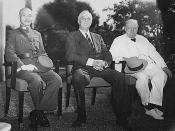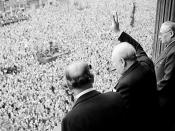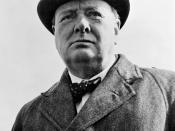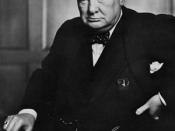Kellen Reimers
1984
Back during the time of World War II, paranoia swept across the globe. Hitler, brainwashing thousands of people into fighting for him, nearly defeated all who opposed him. Had he succeeded in his mission, a fascist government system would have formed, greatly inhibiting the rights and privileges of the general populace. George Orwell wrote 1984 to demonstrate the horror this system would bring. Using setting, characters, and conflict, Orwell uses this book to portray the theme of raw, unrefined humanity, and its ability to rise above a corrupt and confining evil of an enemy.
Orwell distorts the idea of Utopia, an ideal society where human beings live a perfect existence, and creates a fictional setting in which life is extremely bad from oppression, deprivation of rights, and terror. Fear is used as a tool for manipulating and controlling individuals, and nearly every positive feeling is squelched. The world is divided into three political countries: Oceania, Eastasia, and Eurasia.
Each of these states is ruled by a totalitarian government and is constantly warring on multiple fronts. Using the terrifying atmosphere of the archaic world, Orwell creates the illusion that Winston has nowhere to escape the oppression. Winston is forced to live within his present circumstances; able to change where he lives, yet unable to change how he lives. Oceania's political structure contained three segments: the ruling class, the educated workers, and the working class. Orwell, being a socialist, realized that with class distinctions came class struggle. The ruling class, consisting of the wealthy and powerful, was only two percent of the population. In Hitler's Germany, the very few people who were considered part of the ruling class had a more luxurious lifestyle that the masses, yet in this nation, as in 1984, revolt was inevitable.
The conflict between Winston and O'Brien is another way Orwell shows how a society can try to brainwash a person into believing the impossible. For instance, O'Brien wants Winston to believe that two plus two is five, going against all the laws of mathematics Winston has studied all his life. O'Brien is one of the top leaders in the Inner Party, and may even be part of a hive that creates the idea of Big Brother. When O'Brien reveals himself as a representative of the Party and all of its contradictions and cruelty, Winston discards all feelings of friendship and suddenly becomes his enemy. This action directly relates to the theme in how if humanity is confronted with evil, every ounce of effort will be used to resist. Doublethink, the ability to hold two opposing ideas in someone's mind at the same time, is forced into Winston by O'Brien, only confusing him further. If only Winston had accepted the doctrines of the Party, his life would have been spared. Instead, Winston is murdered because of his individuality, ensuring the inability to spread his idealistic views to the public, hungry for freedom and escape from oppression.
Winston Churchill was the exalted leader of England during World War II. One must consider why Orwell gives the name "Winston Smith" to his main character. The name Winston stands for the individuality, uniqueness, and greatness of the character, while Smith stands for the regularity of such a person. In the failing governmental system in 1984, even the greatest person can be shoved aside and told to work in a menial job, negating all hope of ever reaching his full potential. Because Winston is so common, so real, it is easy to identify with him and to imagine being in his shoes. Winston embodies the values of a civilized society: peace, freedom, democracy, love, and decency. When Winston is killed, these things are destroyed with him. He represents the struggle between good and evil, and there is no mistaking where the lines are drawn. A Totalitarian government does not permit these characteristics in their citizens, therefore insisting upon Winston's death.
George Orwell wrote about 1984 in 1948, and the ideals he introduced can still be applied in the present. Although Winston dies at the end, Orwell is trying to show the stubbornness of human nature. We cannot forget that above all, individuality must be expressed, or the common man will have no reason, or desire, to live.





